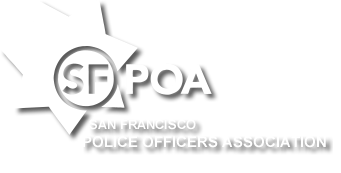In 1988, I entered the honorable profession of law enforcement. I, like most police officers, joined this profession out of pure passion, not seeking profit. Six years later, I applied and was hired as a lateral police officer by the SFPD. It was in that same year that San Francisco voters approved a measure requiring the City to maintain 1,971 full duty sworn police officers available to patrol the streets of our city. That number did not include officers who worked at the airport since SFO had its own police department at that time. That measure was passed to address the dwindling numbers of police officers in the city in hopes that if there were a fixed number of officers set in the SF Charter, then the City would meet that mandated number. Well that was not the case and it is still not. In fact, the City may not have ever met that mandated number of 1,971 police officers and to this day still struggles to achieve that goal.
The current crisis of recruitment and retention of police officers is not unique to San Francisco, the Bay Area, or the state of California. This is now a nationwide problem. Most agencies have dealt with hiring issues in the past, but in today’s highly politicized climate coupled with ongoing false narratives about law enforcement and a historically low unemployment rate, just to name a few, have led to an unprecedented low number of qualified applicants in our profession. Some agencies have also resorted to either changing or lowering their standards for applicants to hopefully broaden the numbers of so called “qualified applicants.” This can be very risky since agencies may now end up with an officer who falls below the previously accepted minimum standards.
Here is a stark example of the problem in our own state. The website for the Peace Officers Standards of Training — commonly known as POST — now has a 33-page list of law enforcement agencies that are seeking sworn personnel to fill police officer, deputy sheriff, special agent, and ranger positions. The agencies are listed in alphabetical order and range from Alameda and Albany to Yolo County and Yuba City. What once was a limited application period in all these cities, such as when I became a police officer, is now a continuous open hiring period with no end in sight to fill the vacancies.
Earlier this year, the City of San Francisco proposed hiring 250 police officers over the next four years. We applaud the City for trying to increase staffing since officers are desperately needed on our streets. But before we say the crisis is over, let’s do the math and see how it all comes out in the wash.
To get 50-55 recruits through the extensive testing and background investigation and into the Police Academy, you need over 2,000 people to just fill out the form at DHR requesting the join the SFPD. Those applying are fewer now than in years past, and most are eliminated though the background process due to the standards in place for our profession. If you do make it into the Academy, there is no free ride. It is not easy to get into the SFPD, and it is not easy to graduate from the Academy, nor complete the Field Training Program.
Here is the most recent example that is becoming far too common. One of the current SFPD Academy Classes started with 55 recruits. This class is now just a few weeks away from graduating after seven months of training and it is down to 28 recruits. Two or three on average do not make it through the Field Training Program so now you have a 50% failure rate from Day One in the Academy to full release into the field as a competent solo police officer. This is the highest failure rate in decades.
Now factor in the average attrition rate in our department, which is about 65-70 officers per year. On top of that, the POA anticipates an additional 60-70 officers may retire before the end of this fiscal year. The additional retirements will be the result of a sick-pay buyout benefit which will sunset on June 30, 2019. The end of the sick pay buyout was the result of an arbitrator’s ruling in favor of the City during recent contract negotiations.
Despite all the efforts by those in the SFPD Recruitment Unit, the pool of candidates is narrow. Our Recruitment Unit is continuously thinking outside of the box on ways to lure top notch candidates. They are travelling across the country going to college campuses, job fairs, and community fairs seeking out those interested in our city. Advertising on billboards, buses, and in the media is constantly being done, but we are suffering the same consequences as other departments: a lack of interested applicants. The often unfair and negative portrayal of law enforcement has led to the vilification of law enforcement in our country. That makes for extreme difficulties in persuading someone that this noble profession is one worth pursuing.
Here are some examples of what agencies have resorted to in order to hire more police officers, or retain those that they already have.
Palo Alto PD is now offering a $25,000 signing bonus for lateral police officers. This is one of the highest signing bonuses in the state, yet they are having difficulties filling the 14 vacant positions they currently have. This is also on top of the recent 4.75% raise for all of their police officers.
The Chief of the BART PD recently requested an additional 54 new hires from the BART Board of Directors as part of a strategic hiring plan. These additional officers are desperately needed based upon recent violent assaults, some of which have led to homicides on BART trains and in BART Stations. Knowing the difficulty that their Chief has had to fill the current vacancies, the BART Board of Directors has proposed hiring unarmed and unequipped “ambassadors” to patrol BART. These individuals will have limited training in conflict resolution or dealing with homeless or those suffering from mental health issues. If implemented, this could lead to unnecessarily exposing the public and BART employees to highly volatile situations that could jeopardize their safety. BART PD is so short staffed that SFPD officers have been supplementing their ranks by working overtime at certain BART Stations in the City.
San Francisco PD has taken a different approach. The POA questions whether or not it is the right approach, or even prudent. During sworn testimony earlier this year in front of an Arbitration Panel during contract negotiations, it was revealed by sworn members of various ranks that the department has lowered its standards in the psychological portion of the background process. The SFPD is now advancing candidates through backgrounds with a Wonderlic Test Score of less than 20. The Wonderlic Personnel Test is commonly used to access the aptitude of prospective employees for learning and problem solving in a wide range of occupations including law enforcement. Against the advice of The Department’s own psychological expert, candidates with a score as low as “C-” can advance to the Academy even though the department has already concluded that those with a score of “C-”or less have a “50/50” chance of passing the Academy.
Do not misinterpret my message. Our officers in the SFPD are the best of the best. They go into harm’s way every day and are happy just to go home at the end of their shift unharmed and knowing they made a difference. The reality is we can’t keep going down the road doing more with less. Minimal raises, an outdated fleet, forced overtime leading to 14-16 work days, misguided legislation and constant over scrutiny by some in management, The DPA, and some in the press is not helping attract anyone into this profession. The demands on law enforcement in our country are greater now than ever. We are doing everything we can, but we are bound by restrictions placed on us through the Board of Supervisors, the Police Commission, and the SFPD Administration.
Regardless of this crisis, we will still respond to every cry for help. We just hope that there will be enough of us to hear you when you call for help.

